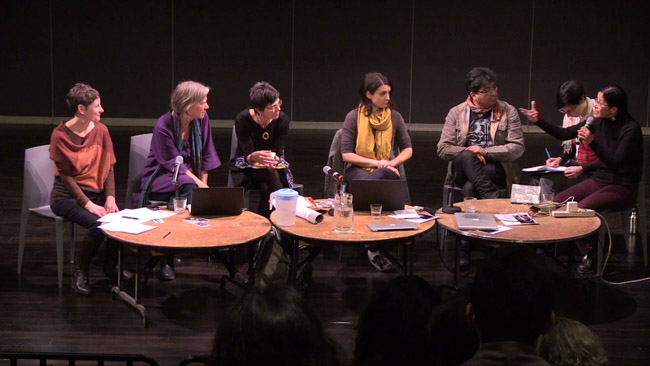Sowing Social Justice – by Shelley Liebembuk
April 27, 2014
Sowing Social Justice: Fighting GM-Corn with Creative Activism
By Shelley Liebembuk
The inspiring conversatorio panel discussion on “Maiz(e) in the Americas: tradition, big agriculture, and resistance” brought together impassioned activists, scholars, and artists—many of whom are all three—to address the dire socio-political impact of genetically modified corn throughout the Americas and speak about their own daring social justice interventions.
The panel addressed two distinct ‘cosmovisions’ (a term used by Deborah Barndt): Big Agriculture and Food Sovereignty. Big Agriculture is the expansion of a corporate, neoliberal model that embraces new technologies as a means to maximize product, fostering a reductivist perspective supported by such infamous corporations as Monsanto. Food sovereignty, in contrast, invests in social justice through a holistic recognition of agriculture as it relates not only to product, but also to labour, land, and community sovereignty and seeks a regenerative and sustainable food economy. In this latter cosmovision, for both Barndt and Violeta Luna, corn as alive, as having spirit is significantly not just a metaphor but a necessary recognition of its centrality as a life-source.
The panelists shared their own wide-range of food sovereignty activist interventions: from Barndt’s small-scale guerrilla action of placing “Local Food/ Global Labour” stickers with images of the migrant workers who are central to ‘local’ food production on grocery produce; to Mary Notari and YesLab’s action this past summer of creating a fake Monsanto press release which promised to create a museum in memory to the soon-to-be defunct original corn seed (See Brian Batchlor’s earlier blog on “Sin Maiz No Hay Vida”); and Violeta Luna’s performance NK-603: Action for the Performer and E-maíz, presented at the festival, wherein she embodies the corn itself, and the increasingly violent new technologies inflicted on this body, deconstructing the notion of genetic manipulation as beautiful progress.
Notably, the panel discussion promoted political engagement as a thoughtful, creative, and aware practice. As Annette Desmarais cautioned: food sovereignty isn’t just about eating local, it is about uprooting current power systems and politicizing all aspects of food. The need to continually become aware of the bigger picture was most concretely framed in photojournalist Julio Pantoja’s striking exhibit “Mujer, Maíz y Resistencia.” Pantoja’s work captures a wide-range of women from across Mexico who are variously involved and invested in the valorization of corn as a cultural sign and against the problematic incursions of corporate GM corn. Using his camera as his tool for political activism, Pantoja carefully crafts these photographs as portraits imbedded in their socio-political context by centering his photos on a rectangular backdrop which frames the women, but extending the photo horizontally to expose the larger scene of which they are a part. As in Pantoja’s work, the conversatorio encourages us to broaden our view of the situation, and to recognize the potential of a unified, socially informed pan-American community.
Click here to go to the conference archive page for this talk
Links to Related Resources:
Julio Pantoja’s website: www.juliopantoja.com.ar
Violeta Luna’s website: www.violetaluna.com
YesLab’s website: www.yeslab.org
Food Sovereignty Organizations:
Via Campesina: www.viacampesina.org/en/
Sin Maiz No Hay Vida: www.sinmaiznohayvida.org
Canadian Bio-technology Action Network: www.cban.ca
